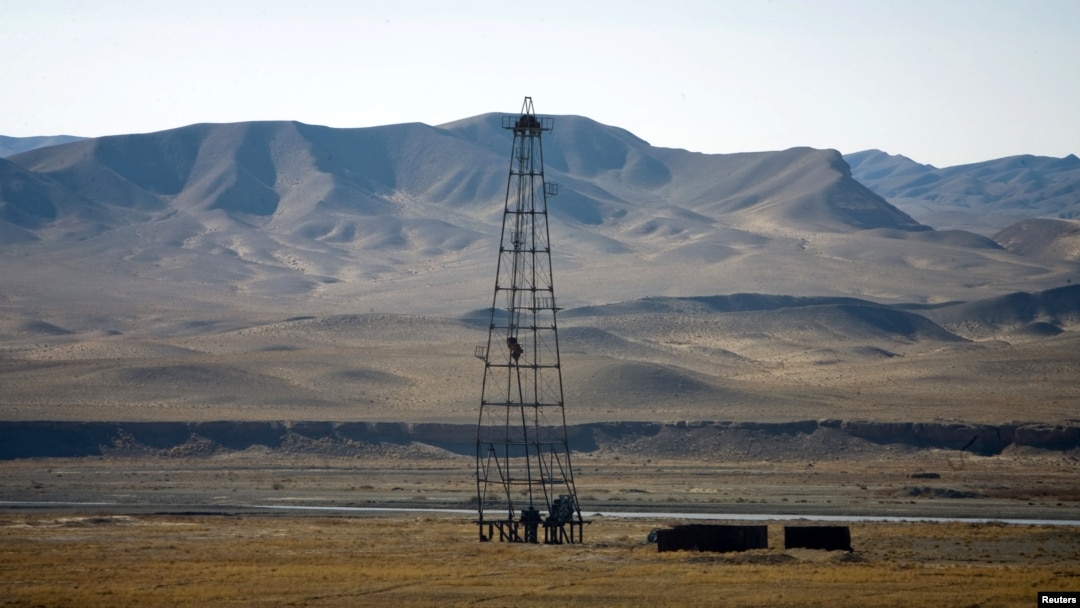By Akmal Dawi

FILE – An oil installation in an area near Herat, Afghanistan, Dec. 17, 2009. A Chinese company has invested in oil production in Afghanistan’s Amu Darya basin.
A Chinese energy company’s investment of $49 million in Afghanistan’s oil production has helped boost the country’s daily crude oil output to more than 1,100 metric tons, but the funding is just one-third of what Beijing originally pledged.
One year ago, China’s Xinjiang Central Asia Petroleum and Gas Co, or CAPEIC, signed a major oil extraction contract with Taliban authorities in Afghanistan. That 25-year contract requires CAPEIC to invest $150 million by the first year and a total of $540 million by 2026.
According to a top Taliban official who spoke to VOA on condition of anonymity, the company fell short of its investment target due to inaccurate estimates of material and labor costs, as well as a three-month delay in the approval of its financial plan by Afghan authorities.
“The investments will add up as the contract stipulates,” the official said, adding that the Taliban’s treasury earned about $26 million from the project last year.
The Amu Darya basin, spanning Afghanistan and Tajikistan, is estimated to contain 962 million barrels of crude oil and 52,025 billion cubic feet of natural gas, according to a 2011 assessment by the U.S. Geological Survey.
To tap into this potential, the Chinese company plans to dig 22 additional wells this year, aiming to increase daily production to more than 2,000 tons, or about 15,000 barrels. One metric ton of crude oil is equal to 7.46 barrels.
Despite attempts to reach CAPEIC for comment via email, the company did not respond to questions about the project.
Budding relationship
Last month, Chinese President Xi Jinping surprised many by receiving the diplomatic credentials of the Taliban’s ambassador to Beijing. It is not clear if Beijing’s action constitutes diplomatic recognition. No country has formally declared its recognition of the Taliban government.
SEE ALSO: China’s President Accepts Credentials From Afghan RepresentativeChina’s move, coupled with limited business deals like the Afghan oil project, suggests Beijing’s pragmatic approach to Afghanistan, experts say.
“Although the attraction of [Afghanistan’s] mining and energy resources is strong, there is considerable Chinese wariness about the internal security situation, the reliability of Taliban assurances regarding foreign investments, and Afghanistan’s poor infrastructure,” Andrew Scobell, distinguished fellow for China at the United States Institute of Peace, wrote to VOA in written comments.
Facing international sanctions and isolation, the Taliban have actively sought Chinese investments and engagement in Afghanistan.
Experts, however, suggest that China’s primary motivation might not be economic gain, but rather curbing potential security threats emanating from its unstable neighbor.
This aligns with concerns raised by several countries, including the United States and Russia, regarding the presence in Afghanistan of foreign terrorist groups that could pose threats beyond its porous borders.
“In the near term, Beijing’s primary focus vis-à-vis Afghanistan is relatively modest: to ensure stability on its westernmost border, remain engaged in the country and sustain its relationship with the new government in Kabul,” said Scobell.
China’s long-term goals in Afghanistan remain unclear, but Beijing’s increasing engagement raises questions about its potential ambitions.
“China’s influence in the country will likely increase, particularly if the situation continues on current indications,” said Barbara Kelemen, an expert at the Central European Institute of Asian Studies.
No U.S. competition
Following nearly two decades of military involvement and more than $100 billion expended in Afghanistan, the United States withdrew its forces in August 2021, leading to the Taliban’s return to power.
The decision sparked much debate and introspection within the U.S., prompting Congress to establish the Afghanistan War Commission.
The bipartisan commission is tasked with examining and reporting on the entirety of the U.S. engagement in Afghanistan from 2001 to 2021, aiming to draw valuable lessons and inform future policy decisions.
“Guess who’s in Afghanistan today? China,” Michael McCaul, chairman of the House Foreign Affairs Committee, said during a hearing on Afghanistan last month.
McCaul and other lawmakers have raised concerns about the possibility of China taking over Bagram airfield in the north of Kabul. The U.S. military used Bagram as its main base throughout the Afghan war.
“We don’t see Afghanistan as a place where we need to compete with the Chinese and the Russians,” Thomas West, the U.S. special representative for Afghanistan, told the hearing when asked what Washington is doing about increasing Chinese involvement in the country.
Although China and the United States exhibit very different diplomatic approaches toward Afghanistan, the U.S. remains the leading humanitarian donor to the country.
U.S. officials report more than $2 billion in humanitarian assistance provided to Afghanistan since the Taliban takeover.
 Afghanistan Peace Campaign
Afghanistan Peace Campaign